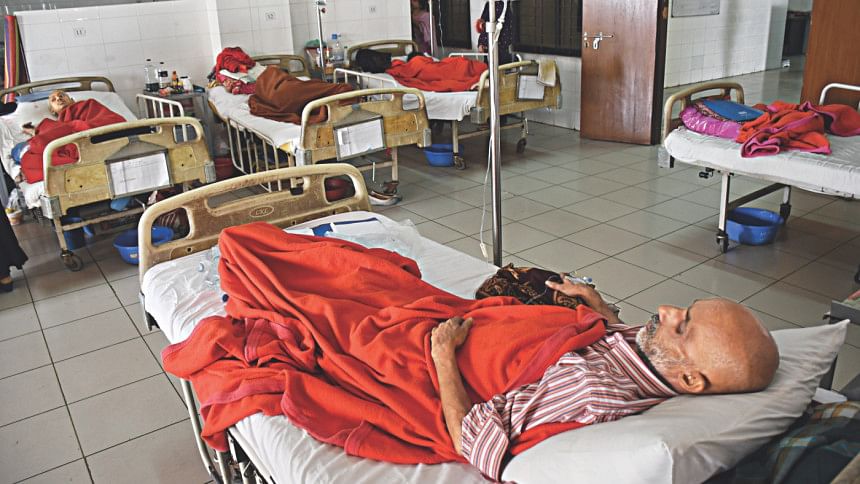Cancer Control: Focus on prevention, developing human resources

Cancer control in the country requires an integrated approach with emphasis on prevention that can help improve quality of life, reduce the possibility of cancer and thus cut health expenditures, experts have said.
Presently, Bangladesh has a serious lack of health personnel and infrastructure for cancer control –though cancer is a major cause of death and physical, financial, mental and emotional sufferings.
About 1.08 lakh people die of cancer while 1.5 lakh people develop cancer every year in Bangladesh, according to the International Agency for Research on Cancer report of 2018.
Dr Habibullah Talukder Ruskin, Associate Professor and Head of Cancer Epidemiology at the National Institute of Cancer Research and Hospital (NICRH), says there are three major aspects of cancer control: prevention, treatment and palliative care.
There are shortages in all of the areas though cancer is a huge disease burden in Bangladesh. There are only around 500 beds for cancer patients in the public hospitals. Considering public and private sectors, there are only around 200 cancer specialists, he said.
In such a grim reality, less than a third of all cancer patients can avail treatment. The rich mostly go to private hospitals or abroad for treatment, while the poor go to the public hospitals. Many patients die with inadequate or no treatment, while many families lose all their properties and savings on cancer treatment, Dr Ruskin told The Daily Star.
Against this backdrop, the Executive Committee of the National Economic Council in September last year approved a project of Tk 2,388.40 crore to establish a 100-bed full-fledged cancer centre in each government medical college hospital in each of the eight divisional cities of the country.
Health experts appreciate the move to improve cancer treatment, but they say cancer control is not all about treatment. A very important aspect of it is prevention as some of the common factors of cancer are chemical-tainted food, obesity, low level of physical activity, consumption of tobacco, betel nut, alcohol, and air pollution.
Hepatitis B and C, lack of hygiene during menstruation, HPV (a sexually transmitted infection), child marriage, birth of too many children within short gaps and not breastfeeding babies can also contribute to cancer, which involve abnormal growth with the potential to spread to other parts of the body.
“Preventive measures, therefore, are a major issue that needs to be promoted to create massive awareness, improve food habits and the environment,” said Prof Dr Rashid-E-Mahbub, chairman of the National Committee on Health Rights Movement.
Need a national strategy and action plan
Health experts say the rising trend of cancer is not new in Bangladesh, but there hasn’t been much work on holistically tackling the deadly disease.
They suggested that the government formulate a national cancer control strategy that incorporates the issues of human resource development, national cancer registry, and full range of treatment facilities in all the cancer hospitals.
It should also consider that all areas under cancer education – medical oncology, radiation oncology, surgical oncology, gynecological oncology, cancer epidemiology, ENT oncology and pediatric oncology – are available in the country, they said.
Cancer registry – hospital or population-based – will determine the trends of cancers and mortality rates, which will help the authorities decide the course of actions to be taken, said Dr Habibullah Talukder Ruskin.
Presently, medical students in Bangladesh mostly study radiation oncology, which is not enough for cancer control, said Dr Ruskin.
“As they don’t study cancer epidemiology, they are not interested in cancer research and preventive activities,” he said.
Also, in Bangladesh most cancer cases are detected at an advanced stage when the chance of recovery is thin, he said emphasising on the training of histopathology and cytopathology as these courses are important for cancer screening.
Presently, there are hospital-based breast and cervical cancer screening programmes, but their coverage is less than 10 percent. There is also no programme on oral cancer screening, said Dr Ruskin, recommending a national cancer screening programme.
Prof Dr Rashid-E-Mahbub said developed countries prioritise prevention and early detection of cancer over treatment.
Prevention is a very important aspect of cancer control to reduce the prevalence of cancer, but it is very weak in Bangladesh. There should be specific programmes focusing on public health issues to promote healthy lifestyles and collaborate with other departments to improve the quality of food, air and water, he said.
“Actually, we need a vision on cancer control. Building hospitals, buying machines and developing logistics only will not work,” said Rashid-E-Mahbub, former professor at the Bangabandhu Sheikh Mujib Medical University.

 For all latest news, follow The Daily Star's Google News channel.
For all latest news, follow The Daily Star's Google News channel. 



Comments